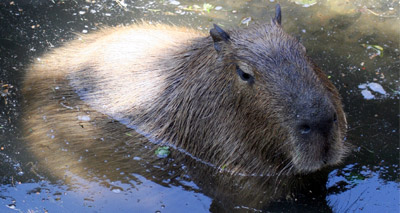"In river catchments managed by beavers, fish stocks are higher, biodiversity is increased, flood peaks are reduced and pollution is filtered out."
Over 20 NGOs support beaver reintroduction
Over 20 environmental organisations in Scotland are calling for the Eurasian beaver to be fully reintroduced and recognised by the Scottish Government as a resident, native species of Scotland.
In a letter to environment minister Dr Aileen McLeod, the collective - which includes RSPB Scotland, National Trust for Scotland and the Scottish Wildlife Trust - said:
"Our collective view is that the Eurasian beaver should be fully recognised by the Scottish Government as a resident, native species in Scotland and that building on the current wild populations in Mid Argyll and Tayside, further licensed releases across other appropriate areas of Scotland should take place in order to viably restore this once widespread, native keystone species"
"We believe that the return of the beaver will help to restore our depleted wetland ecosystems, assisting in the delivery of the 2020 Challenge for Scotland’s Biodiversity and bring a range of other environmental and socio-economic benefits."
The group, who together represent over a quarter of a million members, state that there is sufficient, suitable habitat currently in Scotland to support a thriving and self-sustaining beaver population.
Lindsay Mackinlay from National Trust for Scotland, said: “Wild beavers used to live in Scotland not that long ago. Indeed, we have individual trees growing by our sides now that were present when the last beavers lived in our rivers.
"The National Trust for Scotland believe there is a very strong case for seeing the return of free-living beavers to Scotland as soon as possible. This decision has not been made hastily but has been reached after weighing up the scientific evidence and experiences from other countries. "
Alan Carter, director of Reforesting Scotland, said: "In river catchments managed by beavers, fish stocks are higher, biodiversity is increased, flood peaks are reduced and pollution is filtered out. These are things that society spends millions on, but beavers do them for free.
"They can have negative impacts too, but experience from places as diverse as the Netherlands and the USA shows that these can be managed effectively. On top of this cost-benefit approach, we have a responsibility to bring back to Scotland a species that was made extinct purely through human actions in the past."
Several public consultations have revealed that the majority of Scottish residents support the reintroduction of the beaver. Indeed, this high level of support was a key feature of the successful Scottish Beaver Trial, which finished last year.







 Birmingham Dogs Home has issued an urgent winter appeal as it faces more challenges over the Christmas period.
Birmingham Dogs Home has issued an urgent winter appeal as it faces more challenges over the Christmas period.
